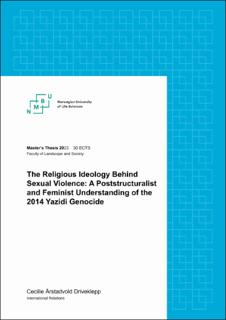| dc.description.abstract | During August in 2014, the Yazidi minority in the Sinjar region in Iraq were victims of a genocide caused by the religious ideology of the Islamic State, ISIS. The men were killed, while the women and girls were forced into sexual slavery. ISIS defends their actions through their ideological interpretation of Islamic religious texts, based on a Sufist political ideology. My thesis will look at ISIS’s use of religious ideology and gendered structures through a poststructuralist and feminist theoretical perspective. Through a poststructuralist perspective, I will look into how ISIS’s ideology reflects on their understanding and teachings of Islamic
texts such as the Qur’an, the discourse surrounding gender and sexuality which makes the Yazidi women victims of sexual violence. Through a feminist perspective, I will analyse the gendered power structures around sex and sexuality leading to the Yazidi women losing agency and autonomy over their own body and sexuality. This will show that the Yazidi women are not just victims of extremist Islamic violence, but were also victims because of the structures and discourse surrounding gender, power and sexuality. | |
